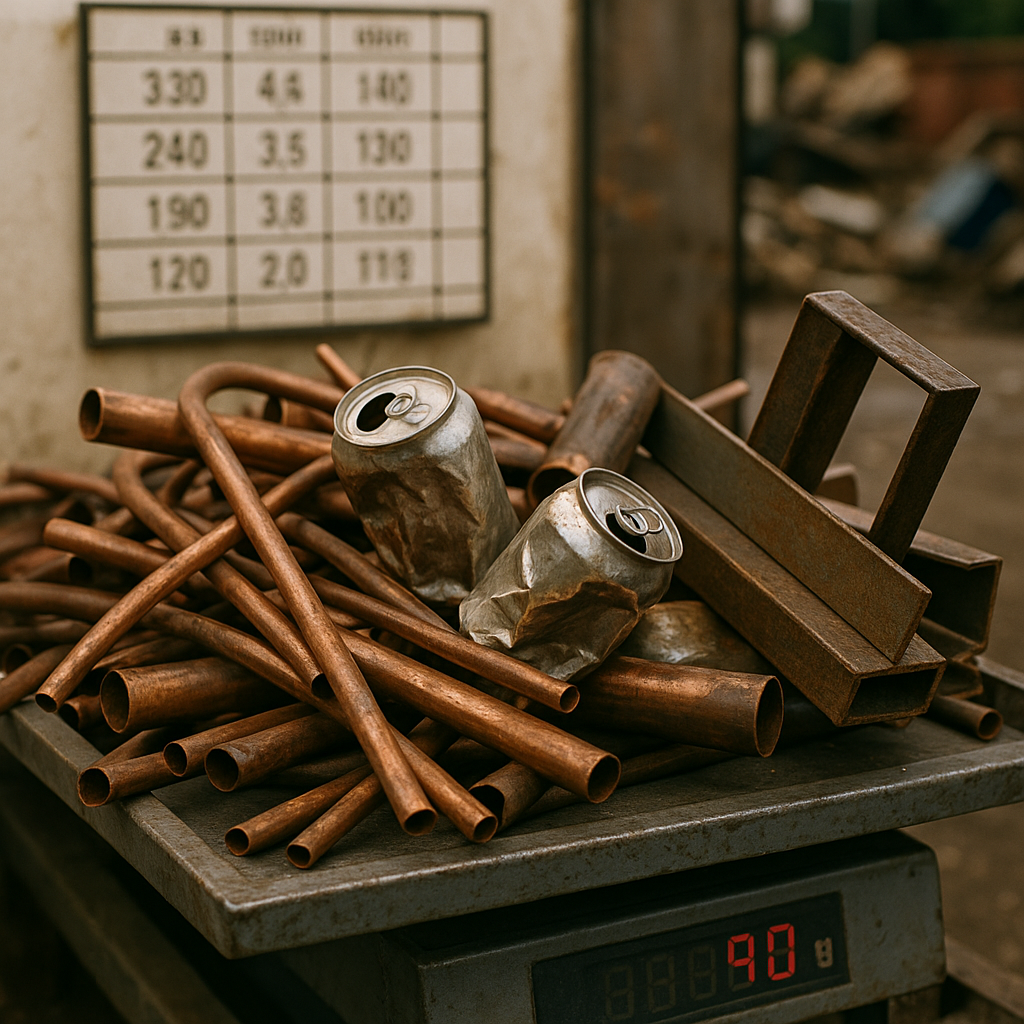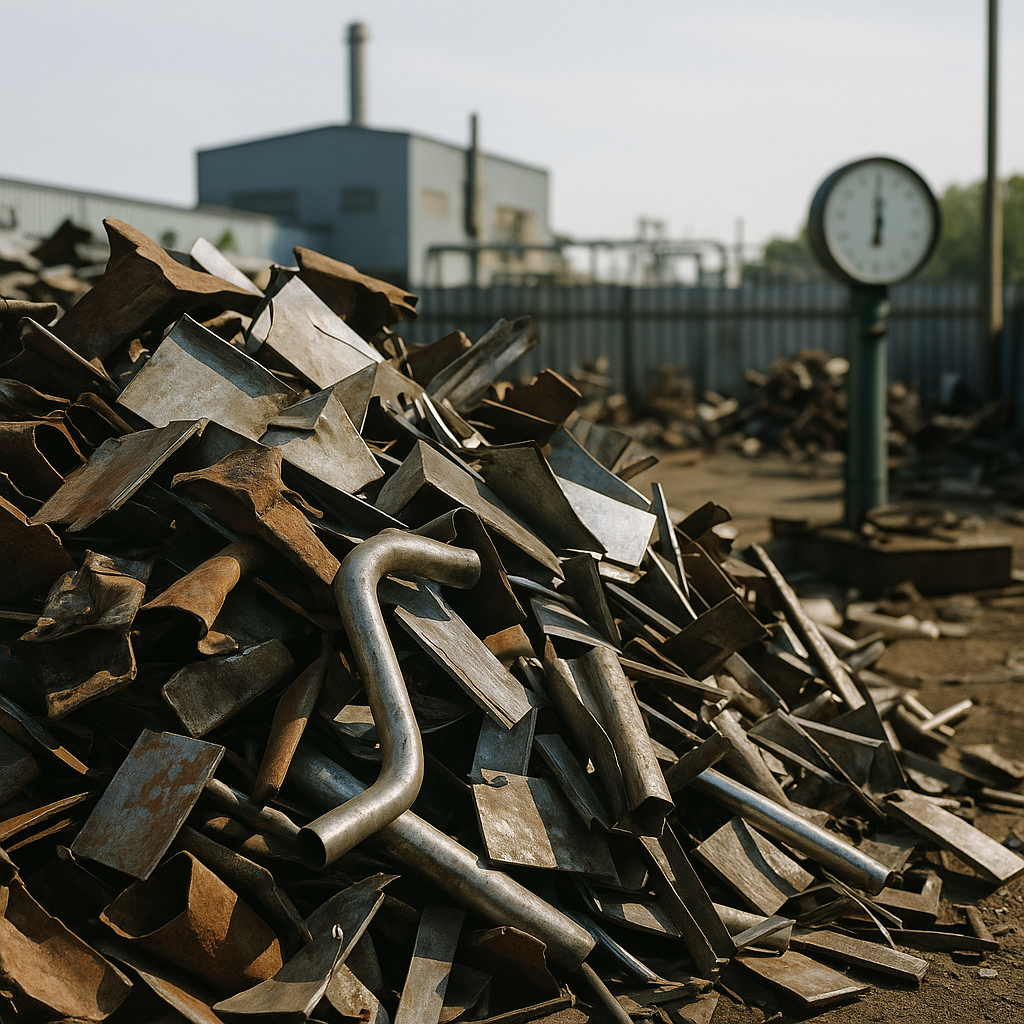5901 Botham Jean Blvd, Dallas, TX 75215
Junk Metal Prices: A Quick Overview For the Best Prices
June 27, 2025Metal markets are constantly in motion. Scrap metal prices fluctuate daily due to global supply chains, industrial demand, and economic conditions. Understanding current values helps you maximize returns when recycling metals.
Steel currently trades at $120-$175 per ton, with higher grades commanding premium prices. Copper remains one of the most valuable common metals, with current rates between $3.30-$3.60 per pound for high-quality scrap. Aluminum prices range from $0.40-$0.85 per pound depending on grade and purity. Brass consistently performs well, with current values between $1.88-$2.30 per pound.
Location significantly impacts the prices you receive for your materials. Urban scrap yards often offer better rates than rural facilities due to lower transportation costs to processing centers. The quality and preparation of your metals also directly affect their value. Clean, sorted materials consistently earn more than mixed or contaminated loads.
What Factors Affect Junk Metal Prices?

The junk metal market functions like other commodity markets. Prices fluctuate due to several key economic factors that recycling businesses and sellers should understand. These factors create a complex interplay that determines your return for materials.
Economic Conditions
Economic health directly impacts metal prices. During recessions, manufacturing slows and construction projects decrease, leading to lower demand for raw materials.
For example, during the 2008 financial crisis, scrap metal prices dropped by nearly 50% as industrial production declined sharply. In contrast, periods of economic growth typically see prices rise as factories increase production and require more materials. The post-pandemic recovery in 2021 saw scrap steel prices nearly double in some markets as manufacturing ramped up again. These economic cycles create predictable patterns in the scrap metal market.
Supply and Demand Dynamics
Supply and demand are fundamental drivers of price fluctuations. When supply exceeds demand, prices fall; when demand outpaces supply, prices rise. Seasonal factors often influence this balance.
Construction typically increases during warmer months, boosting demand for metals like steel, which can lead to higher summer prices for certain scrap categories. Global events can dramatically shift this equation. Trade disputes between major metal-producing nations can disrupt supply chains and cause price volatility, as seen during recent international tariff implementations.
Production Processes and Industry Changes
Evolving industries and manufacturing methods significantly impact metal values. The electric vehicle revolution has increased demand for copper, aluminum, and lithium, altering traditional price patterns for these metals.
Similarly, the growing renewable energy sector requires specific metals for solar panels and wind turbines, creating new market dynamics for recyclers. Technological advances in recycling processes can also influence prices. More efficient recovery methods can increase the available supply of certain metals, potentially affecting market rates.
Exchange Rates and Global Markets
Scrap metal trades globally, making exchange rates crucial to pricing. A stronger dollar typically results in lower domestic scrap prices since it makes U.S. exports more expensive to international buyers. China’s policies particularly impact global markets as it is the world’s largest metal consumer. When China implemented restrictions on scrap imports in 2018, prices dropped significantly in many exporting countries. Regional price differences also exist based on transportation costs, local demand, and competition among scrap yards, creating market inefficiencies savvy sellers can leverage.
Geopolitical Events
Wars, sanctions, and political instability in metal-producing regions create market uncertainty. The conflict in Ukraine disrupted global metal supplies as Russia is a major producer of several industrial metals. Trade agreements and environmental regulations also shape the market. Policies promoting recycling can increase scrap collection, potentially lowering prices through greater supply. Conversely, environmental restrictions on mining can reduce new metal production, increasing scrap values.
Understanding these complex factors helps both recyclers and sellers make informed decisions about when to buy or sell scrap metal. While predicting exact price movements is challenging, recognizing these fundamental influences provides valuable market insight.
How Can You Get the Best Prices for Your Junk Metal?

Turning your junk metal into cash involves more than just loading up your truck and heading to the nearest scrap yard. With metal prices constantly changing and different facilities offering varying rates, maximizing value requires a thoughtful approach. These practical steps will help you boost your earnings from scrap metal recycling.
Compare Prices Between Scrap Yards
Scrap yards often pay different rates for the same materials based on inventory needs and business models. Some yards specialize in certain metals, paying premium rates for those materials while offering lower prices for others. Before selling, call at least three local scrap yards to compare their current buying prices.
Many scrappers find that driving a few extra miles can result in significantly higher payments. For instance, one yard might offer $0.10 per pound for steel, while another pays $0.15—a 50% increase that quickly adds up with larger loads.
Use Apps and Online Marketplaces
Technology has made price comparison simpler for scrap sellers. Apps like iScrap App and websites like RecyclingMonster track current scrap metal prices and help you locate the best-paying yards nearby. These platforms often include:
- Real-time price updates for different metal types
- User-reported prices from local yards
- Maps showing nearby recycling facilities
- Price trend data to help time your sales
Setting up price alerts on these platforms can notify you when rates rise for specific metals in your area, assisting you in timing your sales for maximum profit.
Thoroughly Sort and Clean Your Metals
Boosting your payout is often as simple as proper sorting and preparation. Scrap yards pay more for clean, sorted metals than for mixed loads. Taking the time to separate different types of metal can dramatically increase your earnings.
For example, unsorted copper wire with insulation might fetch $1.10 per pound, while properly stripped bare bright copper can earn over $3.40 per pound—more than three times the value. Similarly, separating aluminum, brass, and stainless steel rather than selling them as mixed metal can boost your overall payment by 20-40%.
Build Relationships with Yard Managers
Regular sellers who build good relationships with scrap yard managers often receive preferential treatment and better prices. By becoming a known, reliable supplier who consistently brings in quality material, you gain negotiating power.
Start by introducing yourself to the yard manager and being professional in all your dealings. Bring well-sorted, high-quality loads consistently, and over time, you may be able to negotiate better rates, especially for larger quantities.
Time Your Sales According to Market Trends
Metal prices fluctuate based on global supply and demand, economic conditions, and other market factors. Monitoring these trends can help you time your sales for maximum profit.
For non-urgent sales, consider holding valuable metals like copper or aluminum when prices are rising. Industry publications, metal recycling websites, and market reports can offer insights into whether prices are likely to rise or fall in the coming weeks.
Consider Bulk Selling for Larger Quantities
If you collect significant amounts of scrap metal, selling in bulk can lead to better pricing. Many scrap yards offer higher per-pound rates for larger quantities, as this reduces their processing costs relative to the volume.
Some facilities even provide pickup services for substantial amounts, saving you transportation costs. For very large quantities, you might bypass local yards entirely and sell directly to metal processors or brokers for premium prices.
Enhance Your Knowledge of Metal Grades
Understanding scrap yard grading can significantly impact your earnings. Knowing the difference between #1 copper (clean, with minimal contamination) and #2 copper (with some paint or solder) allows you to prepare your materials for the highest classification.
Take time to learn about the different grades of common scrap metals like copper, aluminum, brass, and steel. This knowledge helps you communicate effectively with yard staff and ensures you receive appropriate compensation for your materials.
Most importantly, don’t hesitate to ask questions when selling your scrap. Reputable yards should be willing to explain their grading system and how they determine pricing for different materials.
Conclusion: Maximizing Value from Junk Metal

Effectively transforming scrap metal into profit requires strategic thinking and practical knowledge. Staying informed about market rates, sorting and cleaning metals meticulously, and building strong relationships with reliable buyers are essential steps to maximize returns. The effort invested in preparation—such as separating ferrous from non-ferrous metals, removing contaminants, and ensuring proper storage—directly influences the value you receive when selling your materials.
Whether managing industrial scrap or collecting household metal waste, implementing these practices can significantly boost your recycling revenue potential. For professional guidance and competitive rates on your recycling needs, contact Okon Recycling at 214-717-4083.
